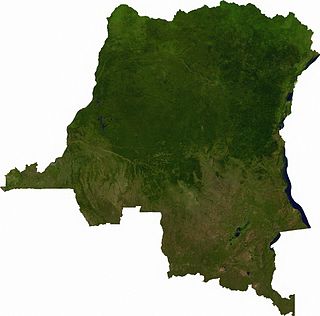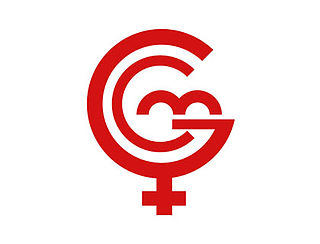
Sparsely populated in relation to its area, the Democratic Republic of the Congo is home to vast potential in natural resources and mineral wealth. Despite this, the economy has declined drastically since the mid-1980s.

Coltan is a dull black metallic ore from which are extracted the elements niobium and tantalum. The niobium-dominant mineral in coltan is columbite, and the tantalum-dominant mineral is tantalite.
The Transitional Government of the Democratic Republic of Congo was tasked with moving from the state riven by the Second Congo War (1998-2003) to a government based upon a constitution agreed on by consensus. In 2001 President Laurent Kabila was assassinated and his son Joseph Kabila was named head of state.

Primary education in the Democratic Republic of the Congo (DRC) is free and compulsory.

The Mining industry of the Democratic Republic of the Congo is a significant factor in the world's production of cobalt, copper, diamond, tantalum, tin, and gold. It is the Democratic Republic of the Congo's largest source of export income. In 2009, the Democratic Republic of the Congo (DRC) had an estimated $24 trillion in untapped mineral deposits, including the world's largest reserves of coltan and significant quantities of the world's cobalt. The United States Geological Survey estimates that the DRC has 1 million tons of lithium resources.

Corruption in the Democratic Republic of the Congo, once legendary, has diminished in recent years, but continues to exceed corruption in most states. The BBC's DRC country profile calls its recent history "one of civil war and corruption." President Joseph Kabila established the Commission of Repression of Economic Crimes upon his ascension to power in 2001.

Democratic Republic of the Congo–United States relations are the international relations between the Democratic Republic of the Congo and the United States of America.

Alexis Thambwe Mwamba is a Congolese politician who has assumed various political roles and offices since the early 1980s going from Minister of Public Works, Minister of State Portfolio, Minister of Transportation, Minister of Planning, Minister of Foreign Affairs and recently in December 2014, he was appointed Minister of Justice of the Democratic Republic of the Congo.

Its location in the center of Africa has made the Democratic Republic of the Congo a key player in the region since independence. Because of its size, mineral wealth, and strategic location, Zaire was able to capitalize on Cold War tensions to garner support from the West. In the early 1990s, however, with the end of the Cold War and in the face of growing evidence of human rights abuses, Western support waned as pressure for internal reform increased.
Cinema of the Democratic Republic of the Congo (DRC) originated with educational and propaganda films during the colonial era of the Belgian Congo. Development of a local film industry after the Democratic Republic of the Congo became independent in 1960 was handicapped by constant civil war.

Deforestation in the Democratic Republic of the Congo (DRC) is a significant transnational issue. In the DRC, forests are cleared for agricultural purposes by utilizing slash and burn techniques.

Democratic Republic of the Congo–India relations refers to the international relations that exist between the Democratic Republic of the Congo (DRC) and India.

The Democratic Republic of the Congo (DRC) was identified by the World Health Organization (WHO) on 11 May 2017 as having one Ebola-related death.

Léonard She Okitundu Lundula is a Congolese diplomat who has served as the Minister of Foreign Affairs and International Cooperation and one of the Vice Prime Ministers of the Democratic Republic of the Congo since December 2016 until March 2019. He has formerly held a number of other government offices in the DRC and Zaïre, being the Foreign Minister before (2000–2003), a Senator, and also chief of staff of President Joseph Kabila's administration.
Poverty is widespread and unchecked across the 26 provinces of the Democratic Republic of the Congo (DRC). Despite being the second-largest country in Africa, with an approximate area of 2.3 million square kilometres (890,000 sq mi), and being endowed with rich natural resources, the DRC is the second-poorest country in the world. The average annual income is only $785 US dollars. In 2016, the United Nations (UN) Human Development Index (HDI) ranked the DRC as the 176th least-developed country out of 188 countries with an HDI of 0.435. More than 80% of Congolese people live on less than $1.25 a day, defined as the threshold for extreme poverty.

The World Bank Group is a family of five international organizations, which has continuously given leverage loans and financial assistance to developing nations like the Democratic Republic of the Congo, commonly known as the DRC. The country has received assistance from the World Bank in the form of social programs in order to induce and sustain economic development. This assistance has been directed toward conflict prevention, investments in education, and addressing environmental degradation.














